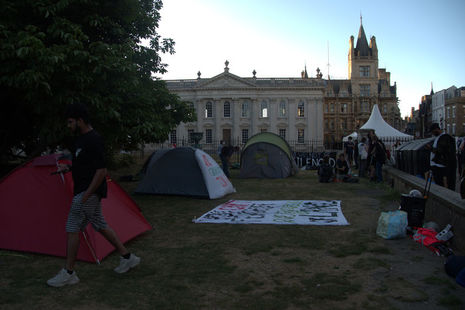University applies for extension to injunction against protesters
The University has also filed for an injunction on Chestnut Tree Lawn

The University of Cambridge has applied for an extension to its injunctions banning pro-Palestine protesters from its head offices.
In an application filed on July 2, the University requested an extension of its current injunctions against protests until July 2026. These apply to its Old Schools Site, the Senate House Building, and Greenwich House — the University’s financial centre.
Along with extending its current legal restrictions, the University has also filed for an injunction on Chesnut Tree Lawn, the land in front of King’s College and adjacent to Senate House Yard. This comes after protesters occupied the land last month, staging a protest outside honourary graduations on 25 June.
Though not used to host graduation ceremonies, Chestnut Tree Lawn is relied on as an emergency fire exit from Senate House when graduations take place.
The University has claimed that encampments on the lawn could pose a danger in the event of a fire at graduation ceremonies, “because tents or similar structures would impede the ability of those escaping from Senate House Yard to move quickly away from danger”.
The application will go to a High Court hearing at the end of the month (23/07). The European Legal Support Center and advocacy group Liberty have intervened in the case.
This action comes weeks after the Office for Students (OfS) warned Universities against “sweeping” bans of protest on University campuses.
The guidance, which comes into effect on August 1, provides advice on how to deal with occupations of graduation sites. While it recognises that temporary injunctions may be necessary on some pieces of land to ensure that events such as graduations can take place, it explicitly warns against 12-month bans on pro-Palestine protests, claiming that they run the risk of meaningfully restricting protest.
The University has continually refuted the allegation that their use of injunctions restricts protest, labelling the claim “ridiculous”.
The legal restrictions on protesting on these sites were originally granted in March, following multiple occupations by pro-Palestine activists in the previous year.
Along with the central University, multiple Colleges have also filed for injunctions preventing the occupation of their sites, following occupations during May and June.
The University has faced criticism for its use of legal restrictions on protest by senior academics, with Professor Jason Scott Warren, an English Fellow at Gonville and Caius College, accusing them of “paying lip service to freedom of speech” while siding with “repressive authoritarianism”.
Scott Warren also sought to prevent the University from extending their injunctions, having filed a motion with the University’s governing body to prevent further legal action, and to ensure students did not face imprisonment or fines for their protests.
A spokesperson for the University stated: “We have sought an extension of the injunction to protect the right of our students to graduate and for staff to carry out their work. Any claim that the University is trying to restrict protest or stifle debate is ridiculous – there are many ways and places where protests can take place and voices can be heard. Protests take place regularly in Cambridge, as is reflected in the judge's decision which stated that protestors are left with ample opportunities and ability to protest their cause in Cambridge. The physical expansion is a health and safety requirement which includes a main fire exit for Senate House Yard.”
 News / Colleges charge different rents for the same Castle Street accommodation2 March 2026
News / Colleges charge different rents for the same Castle Street accommodation2 March 2026 News / News in Brief: waterworks, wine woes, and workplace wins 1 March 2026
News / News in Brief: waterworks, wine woes, and workplace wins 1 March 2026 News / Angela Merkel among Cambridge honorary degree nominees27 February 2026
News / Angela Merkel among Cambridge honorary degree nominees27 February 2026 News / Climate activists protest for ‘ethical careers policy’1 March 2026
News / Climate activists protest for ‘ethical careers policy’1 March 2026 News / King’s hosts open iftar for Ramadan3 March 2026
News / King’s hosts open iftar for Ramadan3 March 2026









